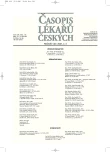Obesity Based on Mutation of Genes Involved in Energy Balance
Vznik obezity na základě mutací genů ovlivňující energetickou bilanci
Pandemie obezity v posledním desetiletí vedla k nárůstu studií zabývajících se problematikou obezity. Intenzivní výzkum obezity přinesl objevy několika genů, jejichž mutace vedou ke vzniku těžké obezity bez významného přispění dalších faktorů. Obezita zapříčiněná mutací jednoho genu se označuje jako monogenní typ obezity. Geny, jejichž mutace vedou k časné obezitě, jsou součástí komplexního systému regulujícího energetickou bilanci a jedinci ve většině případů nevykazují kromě těžké obezity vzniklé v raném dětství další charakteristické znaky. Mutace genu pro leptin, leptinový receptor, proopiomelanokortin, prohormon konvertázu 1, melanokortinový receptor 3. a 4. typu narušují přirozenou humorální signalizaci mezi periferními signály a hypothalamickými centry sytosti a hladu. Defekty ve všech uvedených genech jsou spojeny s fenotypem poruchy jídelního chování ve smyslu přejídání a následným rozvojem těžké obezity v časném dětství. Mutace genu pro melanokortinový receptor 4. typu představují nejčastější příčinu monogenní obezity, neboť prevalence výskytu u časně vzniklých obezit činí v některých populacích až 6 %. Výskyt ostatních monogenně podmíněných mutací je sporadický. Přestože tyto mutace jsou velmi vzácné, lze předpokládat, že další výzkum monogenních forem obezity nám dále objasní doposud neznámé regulační cesty a molekulární komponenty ovlivňující energetickou homeostázi a snad i přispěje k vývoji terapeutických prostředků, jež by byly přínosem pro léčbu běžných forem obezity.
Klíčová slova:
obezita, gen, leptin, leptinový receptor, proopiomelanokortin, prohormon konvertáza 1, melanokortinový receptor 3. typu, melanokortinový receptor 4. typu.
Authors:
I. Hainerová
Authors‘ workplace:
Klinika dětí a dorostu 3. LF UK a FNKV, Praha
Published in:
Čas. Lék. čes. 2007; 146: 240-245
Category:
Review Article
Overview
Within the last decade an intensive research led to an identification of several genes which are involved in a regulation of energy balance. In most cases, carriers of these gene mutations do not exhibit further characteristic phenotypic features except for a severe obesity. Obesity based on mutation of one gene product is called monogenic obesity. Mutations in genes for leptin, leptin receptor, proopiomelanocortin, prohormone convertase 1, melanocortin 4 and 3 receptor disrupt the physiological humoral signalization between peripheral signals and the hypothalamic centres of satiety and hunger. Defects of all above mentioned genes lead to phenotype of abnormal eating behaviour followed by a development of severe early-onset obesity. Mutations of melanocortin 4 receptor gene represent the most common cause of monogenic obesity because they are detected in almost 6 % children with early-onset severe obesity. Mutations of the other genes involved in energy homeostasis are very rare. Although these mutations are sporadic we assume that further research of monogenic forms of obesity might lead to our understanding of physiology and pathophysiology of regulation of the energy homeostasis and eating behaviour. Additionally, they may open new approach to the management of eating behaviour and to the treatment of obesity.
Key words:
obesity, gene, leptin, leptin receptor, proopiomelanocortin, prohormone convertase 1, melanocortin 3 receptor, melanocortin 4 receptor.
Labels
Addictology Allergology and clinical immunology Angiology Audiology Clinical biochemistry Dermatology & STDs Paediatric gastroenterology Paediatric surgery Paediatric cardiology Paediatric neurology Paediatric ENT Paediatric psychiatry Paediatric rheumatology Diabetology Pharmacy Vascular surgery Pain management Dental HygienistArticle was published in
Journal of Czech Physicians

- Advances in the Treatment of Myasthenia Gravis on the Horizon
- Possibilities of Using Metamizole in the Treatment of Acute Primary Headaches
- Metamizole at a Glance and in Practice – Effective Non-Opioid Analgesic for All Ages
- Metamizole vs. Tramadol in Postoperative Analgesia
- Spasmolytic Effect of Metamizole
-
All articles in this issue
- The Polycystic Ovary Syndrome and Its Male Equivalent
- Polyglandular Activation of Autoimmunity as a Manifestation of Subclinical Endocrinopathies
- Evaluation of Results of Iodine Prophylaxis in Czech Republic
- Diabetes Mellitus in Adult Patients with Type 1 Diabetes Shows Immunological, Functional and Clinical Differences Depending on the Presence of Autoimmune Thyroiditis
- Endocrine Orbitopathy and Significance of Autoantibodies Against 1D Protein
- Influence of Early Postnatal Nutrition in Preterm Infants on Their Anthropometric and Hormonal Characteristics at the Age of 10 Years
- Relationships Between the „Eating Inventory“ Factors, Socioeconomic Status, Anthropometric Body Adiposity Indexes and Health Risks in Czech Population
- Levels of Hormones in Plasma and in Synovial Fluid of Knee Joint of Patients with Rheumatoid Arthritis
- The Institute of Endocrinology Celebrates its 50th Anniversary. How is the Institute Poised for the Next 50 Years?
- Half Century of the Continuation of the Institute of Endocrinology in Prague
- History, Presence and Trends of Steroid Endocrinology
- Study of the Genetic Causes of Polygenetically Determined Endocrinopathies – Patience Can Bring Success
- Growth Hormone Treatment in the Institute of Endocrinology
- The Role of Complement in Autoimmune Thyroid Disorders
- Quality of Life in the Patients with Disorders of Sexual Development and with Y Chromosome in Karyotype
- Polycystic Ovary Syndrome in 2006
- Neurosteroids and Their Function
- Regulatory Network of Transcription Factors: Their Key Role in the Development and Function of Pancreas
- Genetic Background of Mitochondrial Diabetes
- Obesity Based on Mutation of Genes Involved in Energy Balance
- Osteoporosis and Aterosclerosis – is there Any Pathogenetic Association?
- Journal of Czech Physicians
- Journal archive
- Current issue
- About the journal
Most read in this issue
- Neurosteroids and Their Function
- Relationships Between the „Eating Inventory“ Factors, Socioeconomic Status, Anthropometric Body Adiposity Indexes and Health Risks in Czech Population
- Obesity Based on Mutation of Genes Involved in Energy Balance
- Growth Hormone Treatment in the Institute of Endocrinology
